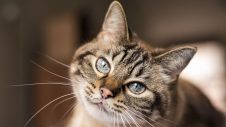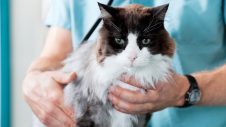Taking care of your senior cat
The graceful lifespan of a cat is approximately 15 to 20 years, with the average around 15 or so. Advances in veterinary treatments and prescription diets together with an incline to the “indoor-only rule” has contributed to this greater life expectancy. Cats over the age of seven to eight years of age are considered senior. As they age, a cat’s dietary, exercise, and healthcare needs will also change, so it’s important that you monitor these changes closely.
Greencross Vets recommend that healthy older cats be examined by a veterinarian twice a year. Pets age much faster than we do and six months for a senior cat is similar to about three years for us, which is a significant amount of time for health problems to develop. Taking your cat to the vet for regular check-ups will help to detect problems earlier, resulting in a happier and healthier feline friend.
Here are some senior cat health care tips:
- Schedule regular health checks with your veterinarian to maintain good health and for the early detection of illnesses and diseases which can help them from becoming more serious.
- Encourage your cat to exercise to maintain healthy body weight, stimulate their mind, and keep reflexes sharp
- Monitor dental health closely and maintain a healthy mouth through prescription dental diets, treats, and toys. You can also brush your cat’s teeth with a special toothbrush and toothpaste
- Monitor their weight and ensure your cat’s diet is meeting all of their nutritional needs and is suitable for their life stage
- Always pay attention to changes in your cat; they hide their feelings well, so if they’re ill or something is wrong, it can be hard to identify
Senior cats are susceptible to a number of common diseases. The most common are chronic kidney disease, diabetes, thyroid disease, and arthritis amongst others. Being able to detect changes in your cat’s behaviour and habits early, and notifying your local pet care team will help to prevent serious long-term health issues.
Some of these signs may include:
- excessive thirst and/or urination
- increased or decreased appetite
- lethargic behaviour – reluctance to move around
- changes to their skin or coat i.e. lumps or bumps
- a significant increase or decrease to their weight
- constipation or diarrhoea
- vomiting
- hypertension (high blood pressure)
- sudden loss of vision
- heart murmur or rapid heart rate
- breathing difficulties
Understanding the range of complex health issues that may affect your cat is key. If you would like to know more, please click on the links below:

 Greencross Vets
Greencross Vets 










